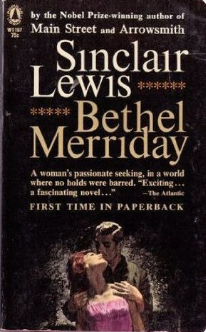 |
| Original 1940 dust jacket cover |
Like all artists -- all painters, all musicians, all poets, even some of those plodding recorders, the novelists -- actors are glorious children, with a child's unwearied delight in the same story over again, and the child's ability to make dragons grow in a suburban garden, but with an adult magic of crystallizing the daydreams into enduring life.
In the summer of 2019 I took a little jaunt to Ellicott City, Maryland, officially known as The Cutest Little Town in the USA. It's really just a long winding street up a steep hill, lined on either side with quaint shops and restaurants, the perfect place to spend the day puttering about. At the bottom of the hill is a multi-level antique mall, which is a great place to look for obscure books. Needless to say I found several that intrigued me, one of which was Bethel Merriday by Sinclair Lewis. Famous for his satires Elmer Gantry, Babbitt, and Main Street, he actually published more than 30 novels. I'd never heard of Bethel Merriday and was intrigued. A quick online search described it as "the story of a young girl on the stage," and since I've become really interested in the theater the past few years I thought I'd give it a go. Plus it was a first American edition! (but sadly no dust jacket -- I've found an image of the original, plus there have been some hideously bad pulp covers on paperbacks, included for your amusement).
 |
| This 1960 paperback cover makes it look really steamy. It is not. |
So. It starts with Bethel as a small child growing up in Connecticut, realizing that she loves to play-act. Eventually she goes off to a women's college and snags a few parts, and despite her family and friends trying to convince her to settle down and marry her home-town honey, she persuades her parents to do a sort of summer theater internship, where (for a fee) she gets a few small parts and does a lot of behind the scenes work in a small theater in a disused former church. Bethel then decides to try her luck on Broadway, and after several months of struggling, discovers that someone from the summer stock company is mounting a new touring production of Romeo and Juliet, with a shocking modern interpretation -- well, shocking in that the actors are all wearing modern clothes. She manages to finagle herself a job as a secretary to the producer/lead actor, the handsome and wealthy Andy Deacon, who is spending all his money on this endeavor. Bethel is also the understudy for Mrs. Boyle, a semi-famous actress who has accepted the part of Juliet for an astronomical sum.
The whole crew go on the road, bringing the Bard to small-town America. By now it's 1938 and the threat of war is looming, but there's very little mention of "the situation in Europe." It's really about the day-to-day struggles of this low-budget touring company and their attempts to at least break even, and the relationships that develop among the players. As the lead character, naturally young Bethel has her admirers -- I counted at least six proposals of marriage Bethel receives from various men in the book, and it might have been more.
 |
| A very pulpy 1962 paperback edition, also laughably bad. |
I enjoyed reading about all the backstage drama and trouble that the company faced, which probably wouldn't be much different today, except they'd probably be in a giant motor coach instead of Pullman cars. (I love traveling by train and the idea of a sleeper car sounds delightful -- they still exist in the USA but they're quite expensive and train food isn't very good any more so I don't know if I'll ever try it). I liked Bethel and the other characters but the story is lacking the real satire that I expected after reading Main Street. I really didn't get a lot of character development, especially with Bethel, who is really a bit too perfect. I've seen other readers complain that the book mostly ignores the buildup of WWII -- the book was first published in 1940 and it is a bit odd, though Lewis had addressed the rise of facism in his 1935 work, It Can't Happen Here. Maybe he really wanted a break from the war and needed to write something escapist? I don't know enough about Lewis to speculate.
There are three classes in the audience in a city theater: those who can afford to go -- of whom some really like the play; those who want it thought they can afford to go -- they are too engaged in hoping they look like regular and expert theatergoers to have much attention left for the play itself; and the students up in the gallery, who love the play savagely or hate it volubly.
 |
| A Spanish edition from 1946. This one is actually quite pretty. |
This is my eighth book for the TBR Pile Challenge.